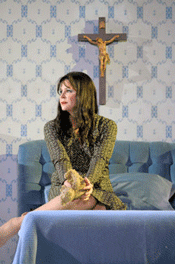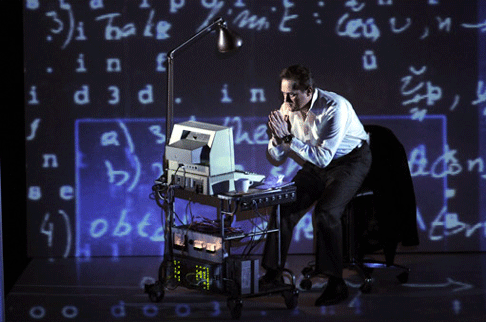07 Jun 2010
La Damnation de Faust in Modern Guise at Lyric Opera of Chicago
During its recently concluded season Lyric Opera of Chicago presented two musical pieces based on the theme of “Faust.”

During its recently concluded season Lyric Opera of Chicago presented two musical pieces based on the theme of “Faust.”
In the more familiar staged version by Charles Gounod Lyric Opera scored a resounding triumph in the fall with several notable role debuts. Now La Damnation de Faust by Hector Berlioz has entered the roster of Lyric Opera’s staged works and can also count as a musically fulfilling venture. The four soloists in this production rank among the foremost interpreters today of the music of Berlioz and of this dramatic work. Paul Groves sang the role of Faust in an interpretation which met all the challenges of the score and also left an individual stamp on his character’s portrayal. His tempter and nemesis Méphistophélès provided the bass baritone John Relyea with considerable opportunities for acting and vocalism. In this role Mr. Relyea was making his Chicago Lyric debut this season. Susan Graham performed the role of Marguerite with memorable artistic commitment, her singing reinforcing the reputation she enjoys for the music of Berlioz. Christian Van Horn sang the role of Brander in a convincing portrayal by which the text matches ideally his movements and gestures. Sir Andrew Davis conducted a fluid and well-rehearsed Lyric Opera Orchestra in a performance expressing the vital nuances of the score.
Soon after the curtain rises in this new production, the figure of Faust appears caught inside a box-like elevated space at the center of the stage. Mr. Groves wore modern, semi-formal dress, and he sat positioned in front of a computer. A cell phone was intermittently visible in the tenor’s hand. The stage as depicted is an effective externalization of the lead character’s feelings of despair and isolation. The walls of the boxed space seem to cause his frustration to grow, just as Groves paced repeatedly to indicate a nervous relation to sounds and emotions from the outside. This staging was, however, less effective in suggesting Faust’s physical journey from the plains of Hungary in the first part of the score to his workroom and surroundings in northern Germany in the second part. Again the viewer was prompted to visualize such a physical transfer and symbolic movement from the projected text. Before that shift in scene a lush orchestral interlude, here richly played, emphasized the spirit of life circulating in the world outside of Faust’s surroundings. Groves seemed to be praying at his computer in order to arrive at some answer to his dilemma of isolation. At this point the chorus emerged from various doors and passageways located below the suspended box. Also here in dress suggestive of a post-World War II decade the chorus sings variously of pleasures and freedom from care. The assemblage in civilian garb then gave way to a group of soldiers bent on recruiting new forces, all preparatory to the stirring Hungarian March. This part was effectively staged as nearly a ballet for the soldiers while Davis kept taut control over the superb playing from the orchestra.
 Susan Graham as Marguerite [Photo by Dan Rest courtesy of Lyric Opera of Chicago]
Susan Graham as Marguerite [Photo by Dan Rest courtesy of Lyric Opera of Chicago]
At the opening of the second part it is clear that Faust’s travels
have not solved his feelings of “ennui.” His opening soliloquy was
movingly intoned by Groves with memorable intonation on “je
souffre” [“I suffer”] and “la nuit sans étoiles”
[“the night without stars”]. Only the entrance of the chorus
singing an Easter hymn prevents Faust from consuming poison. The innovative
staging at this point focused attention on a large standing crucifix shining
with yellow light, while soldiers now intermingled as they removed flags from
coffins lined up symmetrically on either side of the stage. The surging tones
of the chorus showed Faust sensing renewal and a readiness to live, emphasized
by Groves with lyrically convincing high notes pronounced at “O mon âme
tremblante!” [“O my fluttering soul!”]. Ironically it is at
this point that Méphistophélès enters. Mr. Relyea, who emerged as one from the
chorus, removed the collar of a priest from his costume and declared his
presence as the spirit of life. He offers to entertain Faust and to fulfill all
his desires. Once Faust accepted, the atmosphere of Auerbach’s Keller was
rendered as a transformation of the preceding: the coffins on stage opened,
girls emerged to treat the crucifix as a pole for dancing, and a cabaret-like
setting lifted Faust from his torpor. Relyea performs the role of
Méphistophélès as a suave, understated tempter who leads others to the
responsibility of their own downfall. By contrast, Christian Van Horn sang the
role of Brander in the tavern with gusto and fully committed gestures. Faust is
at first attracted yet then repulsed by these lurid displays of the
tempter’s vision of life. From this point to the close of the second part
Faust now coasts toward inevitable infatuation. He is lulled to sleep in a bed
of roses, in the midst of which he sees a vision of Marguerite in his dream. In
this production Marguerite appears in her bedroom caught in the same box-like
structure which earlier housed Faust. She seems to sleep fitfully, as though
plagued by thoughts beyond her control. As he awakens from the dream Groves
calls out the name Marguerite with exquisite sustained top notes. He concedes
to the suggestion of Méphistophélès that they should approach the girl’s
house as part of a crowd of students. As the act ends Faust appears at
Marguerite’s bed holding a bouquet of roses from his dream.
During the third and fourth parts the passionate attraction between Faust and Marguerite reaches its resolution and destructive consequences. At first Faust appears alone in her room and luxuriates in the aura of her accustomed surroundings. When Marguerite begins to speak, she elaborates on her equivalent dream and her vision of the beloved whom she has yet to meet. In the following scene the well-known ballad “Autrefois un roi de Thulé´[“Once a king of Thule”] gives expression to her sentiments of melancholy longing. Susan Graham, poised on a balcony outside her stuffy room and holding a lit cigarette, sang the ballad with touching ardor, the arching phrases matching the movements of the goblet as the King of Thule cast it into the sea. After this moving expression of her character, Méphistophélès called upon the service of various spirits in order to lure Marguerite into Faust’s presence. Their duet of recognition led to a convincing declaration in which both principals sang excitedly of their “ivresse” [“passion”]. The short-lived union is brought to its close by Méphistophélès who warns that the neighbors are calling to Marguerite’s mother that “un gallant est dans ta maison” [“a gallant is in your house”].
 Paul Groves as Faust [Photo by Robert Kusel courtesy of Lyric Opera of Chicago]
Paul Groves as Faust [Photo by Robert Kusel courtesy of Lyric Opera of Chicago]
In the fourth part Marguerite sings plaintively of her love granted and her current loneliness in the romance “D’amour l’ardente flame” [“The burning flame of love”]. Ms. Graham sang the piece with the conviction of one who has granted her entire being in love and is now left with only the memory. In this production she was now shown serving multiple cups of tea to her mother by which she hoped to administer a sleeping potion. Soon afterward Marguerite was led away by armed police when her mother’s lifeless body was discovered. It is at this point that Méphistophélès reminds Faust of his beloved. When Faust learns of Marguerite’s fate he agrees to sign the document by which he will serve the demonic force in order to save her. On two black steeds, as here simulated, Méphistophélès and Faust pursue the Ride to the Abyss as the soul of Faust is claimed in the eternal depths. The final scene unites Marguerite with the lighted crucifix, transformed again from earlier in this production, as she ascends the stairs in God’s forgiveness.
Salvatore Calomino